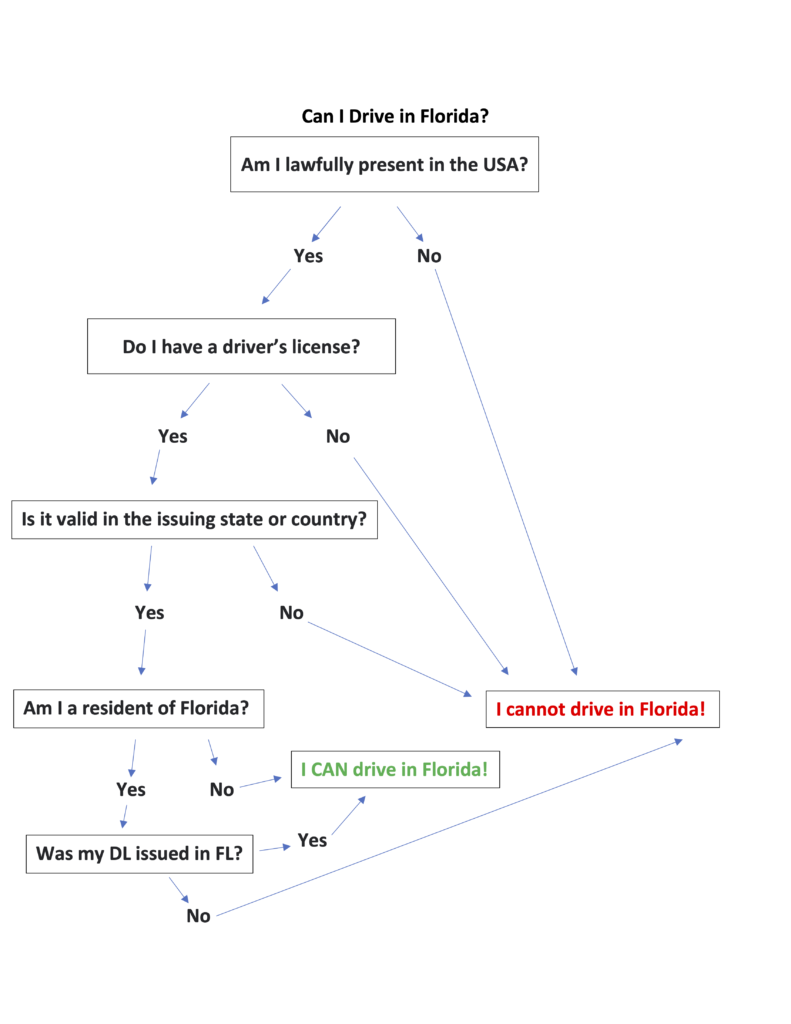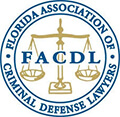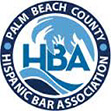In 2019, the U.S. Department of Transportation reported over 15.5 million licensed* drivers in the state of Florida. That number has surely increased with the recent influx of people moving to the Sunshine State. What is less certain is the number of unlicensed drivers in the state; this category contemplates those who have no driver’s license at all and those who may have a valid license in another state or country but do not have a corresponding privilege to drive in Florida. The latter subcategory became much broader in 2023 when Governor Desantis signed SB 1718 into law. Senate Bill 1718 was designed to crack down on illegal immigration at the state level. While many of its provisions were either already law at the federal level or common-sense additions to existing state law, misinformation about SB 1718 sparked a frenzy regarding the potential for enhanced civil and criminal liability.
Of particular concern has been the bill’s new law on driver’s licenses. We wrote this blog in response to the overwhelming demand for clarification as to which classes of noncitizens can drive in Florida and when a Florida driver’s license (as opposed to a foreign or out-of-state DL) is needed.
Can a Noncitizen Drive in Florida?
The short answer is that a noncitizen can drive in Florida if he or she is lawfully present in the United States and has a valid driver’s license. What constitutes a valid driver’s license depends on whether the noncitizen resides in Florida, out of state, or out of the country (read on for further discussion on this). Those who are not lawfully present in the United States cannot drive a motor vehicle in Florida, irrespective of a foreign or out-of-state license recognized as valid in the issuing country or state.
The new law, codified in 322.033 Florida Statutes, explicitly rejects “licenses issued by another state exclusively to undocumented immigrants who are unable to prove lawful presence in the United States.” It is important to note that driver’s licenses from a foreign country were already considered invalid without proof of lawful presence in the U.S. and that the new law only impacted noncitizens who are here illegally but were able to obtain a driver’s license by establishing domicile in one of the other 50 states (California, for example).
What is Considered Lawful Presence for Purposes of Driving in Florida?
We can only discern the meaning of “lawful presence” by looking at its antonym.
The term “unlawful presence” has legal significance in the immigration world, but its interpretation as it pertains to 322.033 remains to be seen (It was not defined in Chapter 322 of the Florida Statutes). According to the Department of Homeland Security, “[u]nlawful presence is the period of time when you are in the United States without being admitted or paroled or when you are not in a ‘period of stay authorized by the Secretary[…]’” Based on this definition, lawful presence does not necessarily mean Permanent Resident Status or even status as a “nonimmigrant” – i.e. people who enter the United States on a temporary basis, such as a visitor or student; it simply means someone who is authorized to be in the United States by the Secretary of Homeland Security. An example of a person who has no legal status but who is lawfully present is someone who has received DACA (Deferred Action for Childhood Arrivals) or TPS (Temporary Protected Status) designation. If Florida follows the federal definition of unlawful presence, noncitizens who wish to drive in the state would have to show some form of federally recognized permission to be in the country.
When Should a Noncitizen Get a Florida Driver’s License?
A noncitizen who is lawfully in the USA and has an out-of-state or foreign driver’s license may feel at ease based on the description above; but getting comfortable at this stage is premature. An out-of-state or foreign driver’s license is still not valid if the driver is deemed a resident of Florida. Florida law requires citizens and noncitizens alike to obtain a Florida driver’s license within 30 days of becoming a Florida resident. According to the Florida Department of Highway Safety and Motor Vehicles (DHSMV), a person is considered a resident of Florida if he or she takes one or more of the following actions in the state:
1. Enrolls children in public school
2. Registers to vote
3. Files for a homestead exemption
4. Accepts employment
5. Resides in Florida for more than six consecutive months
DHSMV may provide a 60-day temporary permit for those who are still gathering the necessary documents to get a FL DL – at minimum, proof of legal name, social security number, and two forms of residential address – but it will only do so if a person has a valid or recently expired (60 days or less) out-of-state license.
When is an Out-Of-State Driver’s License Valid in Florida?
If a driver is not considered a Florida resident, an out-of-state driver’s license is valid in Florida if it is valid in the issuing state AND the driver is lawfully present in the United States.
If a driver is considered a Florida resident, an out-of-state driver’s license is not valid.
If a driver cannot show lawful status in the USA, an out-of-state DL is not valid whether or not the individual lives in Florida.
When is a Foreign Driver’s License Valid in Florida?
A foreign driver’s license is valid in Florida if the DL is valid in the issuing country, the driver is lawfully in the United States, and the driver is not considered a resident of Florida.
Penalties for Driving in Florida Without Lawful Status
The penalties for driving in Florida without a valid driver’s license are the same for citizens and noncitizens. A charge of No Valid DL is a second-degree misdemeanor that carries a maximum penalty of 60 days in jail and a $500 fine. The only exception is when the non-licensed driver causes the serious bodily injury or death of another; in such a situation, Driving Without a License can be classified as a third-degree felony punishable by 5 years in prison and a $5000 fine.
Are you a Noncitizen Accused of Driving Without a License? Hire a Criminal Defense Lawyer with Immigration Law Experience.
Although most criminal defense attorneys are comfortable handling cases for U.S. citizens, the same cannot be said when a criminal charge involves a noncitizen. This is because the average criminal defense lawyer is not proficient in immigration law. Yet, an understanding of immigration law, including its legal definitions and consequences, is often critical to a noncitizen client’s criminal case.
The ideal legal team for a noncitizen displays confidence at the intersection of criminal and immigration law from years of experience in both areas. A dual or multi practice attorney can not only help the noncitizen avoid serious immigration consequences, he or she can review a license charge with full understanding of terms such as “unlawful presence” and accurately assess the legal sufficiency of the government’s case. If, for instance, the attorney determines the client is lawfully present in the United States – say, on humanitarian parole – and has a valid out-of-state license, a Motion to Dismiss the charges may appropriately resolve the matter.
Still Need Help? Here’s What We Said in a Drawing.
For a quick reference and ease of understanding, we have summarized our Florida driving discussion in a drawing. Scroll to the bottom to check it out.
Contact us for your legal needs involving driver license criminal charges.
Casanova Law
(561) 236-5340

*It is unclear from the 2019 D.O.T. data whether “licensed” includes those whose driving privileges were expired, suspended, revoked, or canceled.








